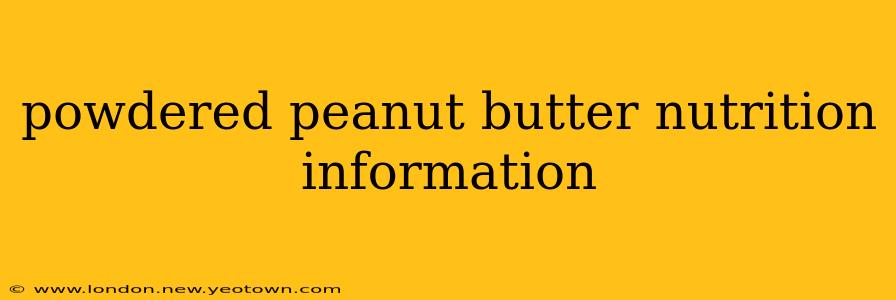Let's be honest, peanut butter is amazing. That creamy, nutty goodness is a staple in many pantries, a quick snack, and a key ingredient in countless recipes. But what if you could get all the peanut butter flavor and protein punch with even more convenience and potentially fewer calories? Enter powdered peanut butter. This innovative product is taking the health food world by storm, but what's the real nutritional story behind it?
This isn't your grandma's peanut butter. Powdered peanut butter is made by removing most of the fat from peanuts, leaving behind a concentrated powder that's then reconstituted with water or milk. This process dramatically changes the nutritional profile, making it a unique and interesting option for those watching their calorie intake or looking for a versatile ingredient.
What are the Nutritional Benefits of Powdered Peanut Butter?
The nutritional breakdown of powdered peanut butter varies slightly depending on the brand, but generally, it boasts impressive levels of protein and fiber. A typical serving (usually around 2 tablespoons of the reconstituted powder) offers a significant amount of protein, helping you build and maintain muscle mass. The fiber content aids in digestion and keeps you feeling full and satisfied, which can be especially helpful for weight management.
It's important to note that because the fat has been removed, powdered peanut butter is lower in calories than traditional peanut butter. This doesn't mean it's magically "diet food," but it can be a helpful tool for those managing their calorie intake. However, the reduction in fat also means a reduction in certain essential fatty acids, so be mindful of incorporating other sources of healthy fats into your diet.
How Does Powdered Peanut Butter Compare to Traditional Peanut Butter?
Let's dive into a direct comparison:
| Feature | Powdered Peanut Butter | Traditional Peanut Butter |
|---|---|---|
| Calories | Significantly lower | Higher |
| Fat | Significantly lower | Higher |
| Protein | Similar or slightly higher | Similar |
| Fiber | Higher | Lower |
| Carbohydrates | Similar or slightly higher | Lower |
| Sodium | Varies significantly by brand | Varies significantly by brand |
| Taste & Texture | Can be slightly less creamy, requires mixing | Creamy, ready to eat |
Does Powdered Peanut Butter Have Added Sugar?
This is a crucial question. Many brands opt for no added sugar, relying solely on the natural sweetness of the peanuts. However, some brands might add sugar or other sweeteners to enhance the taste. Always check the nutrition label carefully to ensure it aligns with your dietary preferences. Look for options that list "peanuts" as the primary ingredient.
Is Powdered Peanut Butter Good for Weight Loss?
The lower calorie and higher protein and fiber content of powdered peanut butter can contribute to weight loss efforts. The increased protein and fiber keep you feeling full for longer, reducing overall calorie intake. However, weight loss is complex and depends on many factors, including overall diet and exercise. Powdered peanut butter shouldn't be seen as a magic bullet, but rather as a potentially helpful tool in a balanced approach to weight management.
Is Powdered Peanut Butter Healthy?
Overall, powdered peanut butter can be a healthy addition to a balanced diet. Its high protein and fiber content offer significant nutritional benefits. The lower calorie and fat content can be beneficial for those managing their weight. However, it's crucial to choose brands without added sugars or unhealthy additives and to be mindful of consuming sufficient healthy fats from other sources.
What are the Best Ways to Use Powdered Peanut Butter?
Powdered peanut butter's versatility is one of its biggest assets. It can be used in various ways:
- Smoothies: Add a scoop for a protein and flavor boost.
- Baking: Use it as a substitute for regular peanut butter in muffins, cookies, and other baked goods.
- Sauces and Dips: Mix it with water or milk to create a creamy sauce for vegetables or as a dip.
- Protein Shakes: Enhance your protein shake with a boost of peanut butter flavor and nutrients.
Remember to always check the instructions on the package for the correct water-to-powder ratio to achieve the desired consistency.
By understanding the nutritional profile and versatile uses of powdered peanut butter, you can make an informed choice about whether this convenient and healthy alternative fits your dietary needs and lifestyle. Happy snacking!

